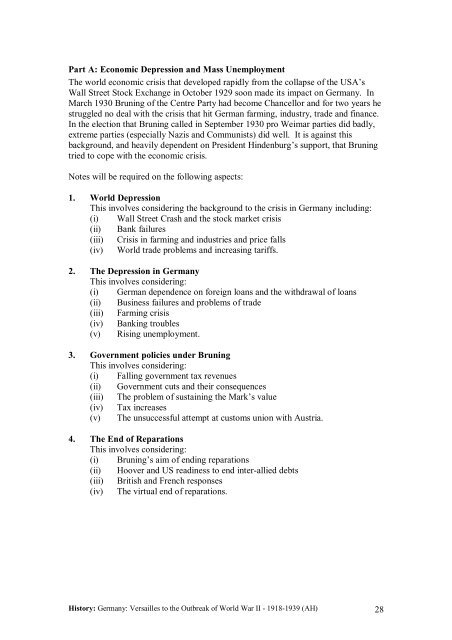PDF file: History - Advanced Higher - Germany - Education Scotland
PDF file: History - Advanced Higher - Germany - Education Scotland
PDF file: History - Advanced Higher - Germany - Education Scotland
Create successful ePaper yourself
Turn your PDF publications into a flip-book with our unique Google optimized e-Paper software.
Part A: Economic Depression and Mass Unemployment<br />
The world economic crisis that developed rapidly from the collapse of the USA’s<br />
Wall Street Stock Exchange in October 1929 soon made its impact on <strong>Germany</strong>. In<br />
March 1930 Bruning of the Centre Party had become Chancellor and for two years he<br />
struggled no deal with the crisis that hit German farming, industry, trade and finance.<br />
In the election that Bruning called in September 1930 pro Weimar parties did badly,<br />
extreme parties (especially Nazis and Communists) did well. It is against this<br />
background, and heavily dependent on President Hindenburg’s support, that Bruning<br />
tried to cope with the economic crisis.<br />
Notes will be required on the following aspects:<br />
1. World Depression<br />
This involves considering the background to the crisis in <strong>Germany</strong> including:<br />
(i) Wall Street Crash and the stock market crisis<br />
(ii) Bank failures<br />
(iii) Crisis in farming and industries and price falls<br />
(iv) World trade problems and increasing tariffs.<br />
2. The Depression in <strong>Germany</strong><br />
This involves considering:<br />
(i) German dependence on foreign loans and the withdrawal of loans<br />
(ii) Business failures and problems of trade<br />
(iii) Farming crisis<br />
(iv) Banking troubles<br />
(v) Rising unemployment.<br />
3. Government policies under Bruning<br />
This involves considering:<br />
(i) Falling government tax revenues<br />
(ii) Government cuts and their consequences<br />
(iii) The problem of sustaining the Mark’s value<br />
(iv) Tax increases<br />
(v) The unsuccessful attempt at customs union with Austria.<br />
4. The End of Reparations<br />
This involves considering:<br />
(i) Bruning’s aim of ending reparations<br />
(ii) Hoover and US readiness to end inter-allied debts<br />
(iii) British and French responses<br />
(iv) The virtual end of reparations.<br />
<strong>History</strong>: <strong>Germany</strong>: Versailles to the Outbreak of World War II - 1918-1939 (AH) 28
















